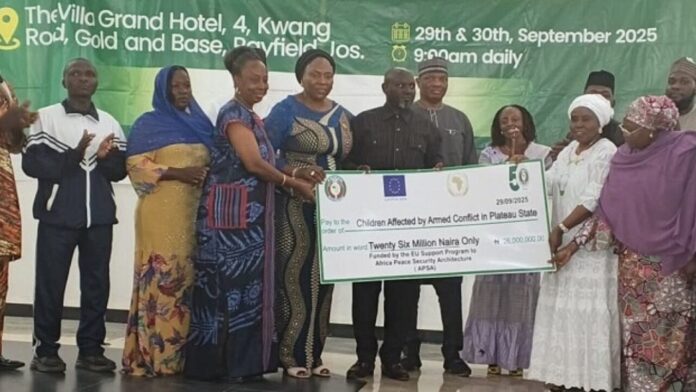The European Union (EU) and the Economic Community of West African States (ECOWAS) have donated a total of N82 million to support displaced children and conflict-affected farmers across Plateau State.
The support package includes N26 million targeted at children’s education, nutrition, and psychosocial needs, and another N56 million to help farmers whose farmlands were destroyed during violent conflicts. The intervention was announced during a two-day Humanitarian-Development-Peace (HDP) Nexus Workshop held in Jos from September 29 to 30, as part of activities marking Peace Month 2025.
The donation to children is being implemented under the African Peace and Security Architecture Support Programme and will benefit communities across Mangu, Bokkos, Riyom, Barkin Ladi, and Bassa local government areas. It aims to provide food, school materials, and psychosocial support for internally displaced children.
Governor Caleb Mutfwang, represented by the Permanent Secretary to the Secretary to the State Government, Mr. Dayi Timothy, described the initiative as timely and aligned with the state’s priorities.
“This initiative aligns with our government’s first policy thrust of peace and security. We recognise our partners—the Peace Building Agency, civil society, and local authorities—for their support. Plateau State is committed to taking leadership in peacebuilding while ensuring humanitarian relief and development go hand in hand,” Timothy said.
Director of Humanitarian and Social Affairs at the ECOWAS Commission, Dr. Sintiki Tarfa Ube, said the intervention reflects the regional body’s commitment to healing and recovery.
“At the heart of the humanitarian-development-peace nexus is resilience. By supporting food, education, and psychosocial needs, we are laying the foundation for peace and prosperity, not only in Plateau State but across the region,” she stated.
Ube added that the donation goes beyond immediate relief, helping children regain dignity and farmers rebuild their livelihoods.
The Minister of Humanitarian Affairs and Poverty Alleviation, Professor Nentawe Goshwe Yilwatda, represented by Bashir Aminu, commended ECOWAS for its role in complementing government efforts.
“This gesture from ECOWAS is not just aid, but an investment in peace and stability. It complements government efforts to protect the dignity of our citizens and restore livelihoods across conflict-hit areas,” he said.
The Director General of the Plateau State Peace Building Agency (PPBA), Mrs. Julie Sanda, warned that without sustained investment in displaced children’s education and welfare, the state risks losing a generation to prolonged instability.
“This support from ECOWAS affirms that peacebuilding, humanitarian response, and development must go hand in hand if we are to secure Plateau’s future,” she said.
The Director of Relief and Rehabilitation at the Plateau State Emergency Management Agency (PLASEMA), Mrs. Julie Bala, highlighted the scale of the crisis, noting that more than 31,000 households have been displaced across the five LGAs since May 2025. She called for sustained partnerships to address both immediate needs and long-term recovery.
Development partners, including the GIZ Peace Core Project funded by Germany’s Federal Ministry for Economic Cooperation and Development (BMZ), also pledged continued support for integrated peacebuilding and recovery initiatives in the state.
Speaking on behalf of beneficiaries, Mr. Malau Malan, Camp Coordinator of St. Gregory IDP camp in Bokkos, expressed gratitude to ECOWAS, the EU, and the African Union.
“Our children have been out of school, and families are struggling to survive. With this support, parents see light at the end of the tunnel, and children can dream again,” he said.
The workshop concluded with renewed commitments from government officials, development partners, and civil society to deepen collaboration and promote locally led approaches to peacebuilding and humanitarian response in Plateau State.

